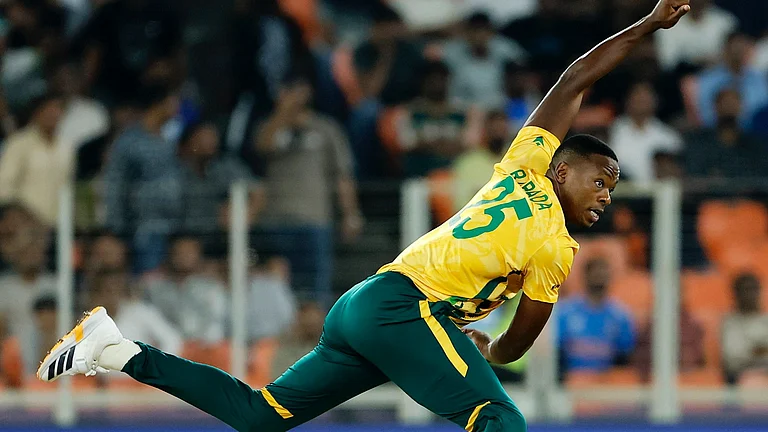Last time Indians got worked up about confusion and unrest - and violence -in Nepalese streets was over the l'affaire Hrithik Roshan and the generalopinion was one of bemusement and wonder at what the big deal was all about, evenif an Indian film star had made derogatory and racist remarks (not thathe had, as it turned out).
That would perhaps give us an idea about how sensitive the Nepalese are andthe tremendous power mere rumours and chinese whispers can exercise over publicat large.
So no surprise really at the utter confusion and bewilderment among theNepalese this time around in the aftermath of a tragedy of such monstrousproportions -- and the appalling public statements by people who ought to knowbetter.
Not surprising, but shocking nevertheless. And outraging when we consider thearrest of the three journalists. But more on that later.
The people are angry and fed up with the misinformation campaign going onsince Friday night: "The government is keeping us completely in the dark. They don't want usto see and hear anything. Because they are scared we will find out thetruth," to quote just one irate student. The much ballyhooed probe finally began today, people remain sceptical.
Will it finally reveal the truth? Given the background, it would be pretty hard to everknow for sure but this much we do know:
A reasonably well-respected king is brutally killed along with manyother royal family members.
And then the alleged killer is anointed king, when rumour has it that he is already brain-dead and certain not to survive. But, hey, he dies and is cremated in completesecrecy. Curfew is imposed. People are prevented from paying their respects..
The then regent and now king, Gyanendra, and the prime minister Koirala comeup with a desperately pathetically, insultingly unbelievable yarn about an'automatic weapon which suddenly exploded' being responsible.
Don't people deserve at least to be told what happened exactly rather thanthese blatant, clumsy attempts at fudging? No matter what the motivations.
Even if one leaves out the reputation for recklessness that the son of thethen regent - now king - Paras enjoys, weren't the highlyfantastic and nuanced conspiracy theories that were doing the rounds enough toimpel the authorities to come clean and to release a full detailed medical report on the nature of Dipendra's fatalinjuries?
Not to mention the high drama indulged in by the dy. prime minister Paudelwho calmly denied his earlier statement of Saturday pinpointing Dipendra as thekiller: "I never said the crown prince did it."
Indeed. The press must have been responsible for the misquotes at length, wepresume.
If it was not a cover-up then every conceivable step certainly seemsto have been taken to ensure that it sure as hell at least looked likeone.
Ask those old enough to remember the Emergency, and they'd tell you that in theabsence of credible information, people will believe anything. Be itinformedspeculation, mere gossip, rumours, or plain paranoia passed off as privilegedinformation. Mutated in a grotesque cycle of chinese whispers.
And we seem to have had a whole lot of it already: The prince had bulletwounds on his back. No, he did not. Yes, no, maybe, perhaps, er, no, actuallythe bullets had exited from the back. The Indians were behind it, colluding withthe Americans (as certain sections of Pakistani press reported) No, it'sactually the Chinese with the Pakistani Islamist ISI types out to destabilisethe world's only Hindu kingdom, as the redoubtable Rajeev Srinivasan shot backin rediff (I can barely wait for Shri Arvind Lavakare to pronounce his verdict).
Shri BalThackeray, though a bit late to get into the act, has been the only one tooffer the most, well, detailed account yet. More will undoubtedly follow.
And then there were those supposed eye-witness accounts published in TheWashington Post and The Times of London and in the Nepalese press onTuesday. Not to mention the Star News exclusive, again based on thetestimony of an eyewitness. Or the first eye-witness account in the formof the account provided by Rajiv Shahi, son-in-law of the slain king Birendra'syoungest brother Dhirendra that surfaced yesterday.
In the face of the changing line and the stories shifting with the time ofday, it's going to be difficult to believe even the truth, even ifthat is what is coming out now. Meanwhile the RAW/US and ISI/China theoriesare going to continue to be on a merry-go round and the intent here is not to dismiss themout of hand, outlandish and bizarre as they are. Since the time of Kandaharhi-jacking, various defence strategists and security-wallahs from paanshops to elite institutes have pontificated on ISI's increasing presence in the Himalayankingdom with increasing concern that is borne out also by reports that the Pakistani embassy seemed to know about Dipendra's appointment as king much before the palace came up with an official version.
Already, people are busy poring over the discrepancies between the variousaccounts available. Instead of filling in the gaps, the reports have led to aflurry of unanswered questions. And there are many. Doubts are being raised about the long timehaving been taken before any one stepped up to recount what happened. Notto mention the spin provided by the new king and the prime minister.
And then you have the crackdown on the press with the arrest of Yubaraj Ghimire,editor of Nepal’s largest-selling Nepali daily Kantipur along with its Managingdirector Kailash Shiroiya and director Binod Gyawali.
Charge? Treason. Crime? Publishing an opinion column by a prominentmaoist leader alleging that India’s Research andAnalysis Wing (RAW) and the CIA were behind the unrest in the country.
But hadn't thebuild-up started two days ago, when the newspaper, in a front-pageeditorial, demanded more transparency in investigations into the palace massacreand underscored the people’s right to know the truth? And isn't there also thesmall matter of the same publications having been responsible for exposing theinvolvement of the powers that be in various shady deals?
Yubaraj Ghimire is a well-respected journalist who's worked for variousreputed news publications including BBC, Indian Express, India Today and Outlook. All ourstaffers whohave had the pleasure of working with him here remember him fondly as acommitted, professional journalist, not given tosensationalism or intrigues.
However bizarreBhattarai's piece may have been -- and it was pretty bizarre andfantastically far-fetched and outlandish to an Indian eye -- suggesting inter alia"that RAW was behind planning the killings along withthe CIA through its FBI branch opened in New Delhi" and such like - tocharge the editor of the publication with treason is like sounding the deathknell of free-press and an already fragile-democracy.
At this point, it is time to state the obvious -- it should be wellunderstood that an opinion piece carried in a publication is to bedifferentiated from its editorial stance. Often ludicrous opinion fromfringe groups are carried in order to show the sheer stupidity and lunacy of thepeople holding such, well, opinions, so that the readers and others can see theflights of fancy, passed off as fact, and the flaws therein for themselves, andare thus able to discern the veracity or otherwise of the assertions made.
It is only when all manner of significant points of view are allowed freeairing, thus opening them to public scrutiny - and ridicule - so that they canbe rebutted in a free and fair manner, that a semblance of public discourse canbe said to exist which is particularly useful in troubled times like this,which, we should remember, is solely the result of inept handling by the powersthat be in Nepal.
In view of the recent maoist trouble in Nepal, and given the fragile state ofdemocracy in the country, it is all the more importantthat this be done, so that at least the reading public, which can safely beassumed to be more discerning, would know where such rumours emanate from and how incredibly nonsensical they were.And it isn't as if these -- and more -- outlandish rumours were not doingthe rounds otherwise. And the sole responsibility for that rests with the newking and the prime minister.
To allow and encourage a free and frank, debunking of Mr. Bhattarai's piecein the nature of a rebuttal would have been far more usefulthan any attempts to try to muzzle and throttle the press, even for theperpetrators.
With reports appearing of the new king dealing directly with the army andbypassing the prime minister, and possibilities of an emergency being imposedlooming large, the current situation calls for those responsible for the follyto try and understand the role their clumsy lies and misinformation attempts,however well-intentioned they may claim those to be,have played in the situation coming to such a sorry pass.
A support for Kantipur and solidarity with Yubraj at this time --without being fully conversant with the facts of the case -- orindeed a condemnation of the charge against Yubraj and his colleagues, should not be construed as asupport for the ideas expressed by Mr. Bhattarai in the impugned piece, butmerely assupport and solidarity for the freedom of the press, which is all aboutaddressing dissenting views free play.
As Voltaire famously said, "I may not agree with what you say, but Iwill fight to death your right to say it." That is what any editor -- and Iam sure Yubraj would be the first to admit, he too -- feels whenever (s)he decidesto carry a contentious opinion piece.
But, yes, we do need a debate on the timing - a moment of crisis - of the inpugned opinion piece. May be some other time.

























